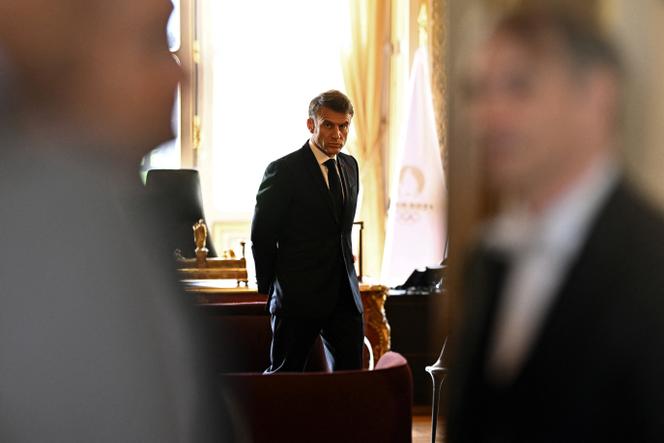
No one saw his face. Hardly anyone heard his voice. On Tuesday, June 25, from his office on the second floor of the Elysée Palace, President Emmanuel Macron orchestrated a conference call with the key figures in his government, the leaders of the parties allied to him, and a few loyalists, such as the former president of the Assemblée Nationale Richard Ferrand and the former agriculture minister Julien Denormandie.
The president himself spoke very little. He listened, without revealing much. Five days later, the first round of legislative elections would be held, following the dissolution of the Assemblée Nationale on June 9. The president’s decision was disastrous, in the eyes of most participants. But now was not the time for anger or lamentations. It was time to think about the strategy to adopt in the second round against the Rassemblement National (RN). The far-right party, which triumphed in the European elections, has never seemed so close to power.
Macron has always prided himself on being the best barrier against Marine Le Pen’s party, which he defeated twice in the 2017 and 2022 presidential elections. But this time, the president has run out of steam, caught between the Nouveau Front Populaire (NFP), a left-wing alliance bringing together the Socialists, Greens, communists and La France Insoumise (LFI), on the one hand, and the RN, on the other. “Macronism is finished,” declared former French president François Hollande, who is running as an NFP candidate, on June 22. Could a “republican front” – the tradition by which French parties call to vote for the best-placed candidate to keep the far right out of office – still prevent the RN from sweeping the absolute majority? In many constituencies, candidates from Macron’s coalition could come in third place in the first round of voting. Should they withdraw from three-way second rounds to the benefit of left-wing candidates, or in some cases right-wing Les Républicains candidates, to help block a far-right victory?
‘Perilous temptation’
On the conference call, an initial consensus emerged for a “neither-nor” option: neither RN nor LFI. But nothing was definitively decided, said the Elysée Palace, which informed the press of the content of the meeting and watched for public reactions. The line was consistent with the campaign rhetoric hammered home by Prime Minister Gabriel Attal over the past fortnight on the dangers of the “two extremes.” Attal has been making voters shudder over the RN’s program and also that of the NFP, dominated according to him by the ideas of LFI, and which would lead the country to bankruptcy and chaos. Drawing an equivalence between RN and LFI reflects the feeling of part of public opinion, which is as frightened of the LFI leader, Jean-Luc Mélenchon, as it is of the far-right leader, Jordan Bardella.
You have 62.93% of this article left to read. The rest is for subscribers only.